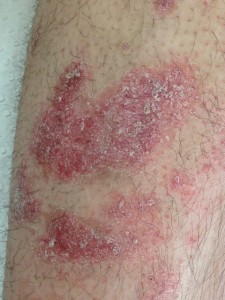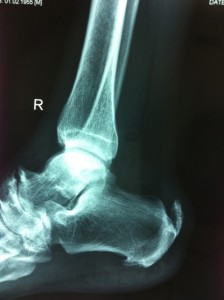Psoriatic Arthritis: It's easy to miss

I have a sneaky suspicion that in dermatology clinics and GP rooms all around the land, many patients with psoriasis sit unaware of why they have pain in their joints, tendons or spine.
Ok, it's more than a suspicion. We know this occurs.
Psoriasis is a really common skin condition. It causes a reddish, scaly rash. Typically on the elbows or over the knees, or on the scalp but it can affect any bit of skin. It can be very mild with a small patch or terrible severe covering large parts of the body.
Up to 30% of patients with this skin disease are thought to also get musculoskeletal problems. Rheumatological Issues.
That's why we rheumatologists are involved in the care of psoriasis patients. And we want to be more involved.
Psoriatic arthritis (read more) is unfortunately easy to miss. Easy to not think of and therefore, often not diagnosed or misdiagnosed.
If patients with the skin condition present with polyarthritis, that is, multiple painful and swollen joints simultaneously, it will usually be picked up. Florid disease triggers action.
The more common scenario is the patient who has "minor" complaints. Possibly just a knee which is a little swollen. Or a wrist which aches in the morning. Or maybe, it's been that damn Achilles' tendon or tennis elbow (enthesopathy) that has been irritating for months. In many, there's some neck or lower back pain that's associated with morning stiffness.
Sometimes, it's all the above, waxing and waning over years.
Each complaint/symptom can be explained away on the basis of poor body mechanics or some trauma such as a lifting injury or excessive exercise.
It's easy to miss (and misdiagnose).
Frustratingly, blood tests often don't help. Psoriatic arthritis belongs to the seronegative spondyloarthritis group (learn more about this group). Seronegative because the RF (rheumatoid factor) tests is negative but in many cases, inflammatory markers are not raised. There is also no specific antibody test we can measure for psoriatic arthritis.
Makes our lives difficult, doesn't it?
Radiology can be helpful. There can be erosions seen on Xrays and often there is some overgrowth of bone that can be suggestive. These changes take time to develop so by the time the changes are very suggestive of psoriatic arthritis, it's pretty late. Early on, what you see on radiology can be non-specific and can be explained by other reasons.
I'm painting a pretty demoralising picture.
Like so much in rheumatology, we need to do better. It does start with awareness but we then need targeted campaigns to highlight this problem in clinics where patients are already being seen: Skin units, Dermatology clinics and the local GPs' rooms.
We want ways to stop this diagnosis being missed.
Any ideas how?



